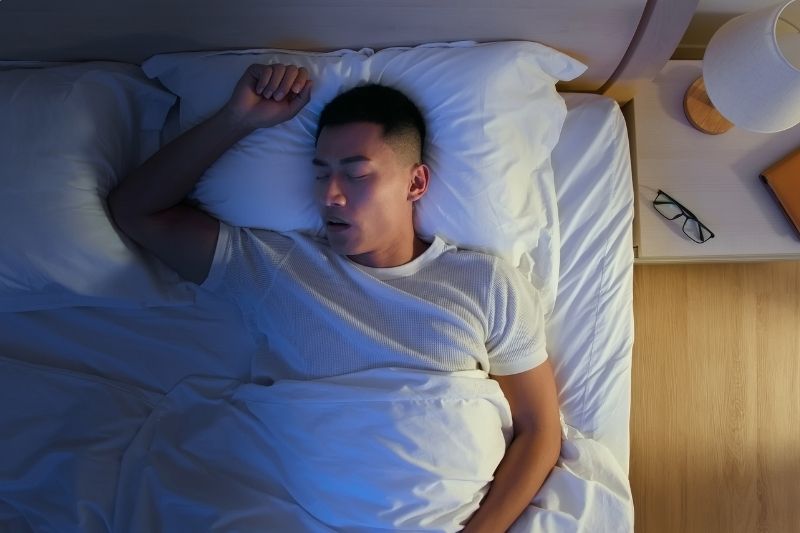Whether your night breathing sounds like clucks, whistles, snorts, grumbles, or rumbles, snoring can disrupt your and your partner’s sleep. About 45% of people snore occasionally, and 25% snore nightly. That means a lot of people are not getting a good night’s rest.
Snoring itself is not a health issue, although it can be for your partner if it prevents them from a good night’s sleep. However, snoring can be a symptom of obstructive sleep apnea, which can increase your risk of high blood pressure, stroke, heart attack, and accidents.
Fortunately, there are ways to treat and prevent regular snoring so that everyone in your house has a better chance of sleeping soundly through the night.
What causes snoring?
Snoring occurs when your airways are blocked. This blockage can come from congestion from colds or allergies. Lax or bulky throat tissue can also block your airways when you sleep, as can relaxed tongue and throat muscles. Additionally, large tonsils or adenoids can also obstruct your airways.
While anyone is at risk of snoring, there are factors that make it more likely you’ll be a noisy sleeper. These include being:
- Male
- Older
- Overweight
- A back sleeper
While it’s not clear why men snore more than women, older adults snore more frequently than younger people because muscle tone gets weaker with age, making it more likely our throat muscles collapse into our airways. Additionally, if you have a close family member who snores, you also have a higher chance of snoring.
While there are numerous health issues associated with being obese such as type 2 diabetes and high blood pressure, obesity can also contribute to a restricted airway and snoring. Fat deposits in your neck can obstruct your airways when you sleep.
Also, surprisingly, things you may try to help you sleep can induce snoring. For example, taking a sleep aid can help you relax so you can fall asleep, but it can also relax your throat muscles, restricting airflow and making you snore. Alcohol acts in the same way by making you drowsy but also relaxing your muscles, causing them to collapse and obstruct airflow.
How to prevent snoring
Fortunately for your bedmate, there are a variety of ways you can mute your snoring. Prevention techniques depend on the reason you snore, the severity of your snoring, and your comfort level with various treatments. Prevention suggestions include:
- Sleeping on your side
- Elevating your upper body with a wedge pillow
- Allergy or cold medicine to reduce congestion
- Nasal strips that open nasal passages
- Avoiding alcohol or sleep aids before bedtime
- Lose weight
- Wear a mouth guard to ensure proper airflow
If you suspect you or your partner has sleep apnea, you should see your doctor for a diagnosis and treatment options.
How to cope with a partner who snores
While you may be tempted to sleep with a pillow over your head if your partner snores — or a pillow over their head — there are less drastic ways to help you block out your partner’s rumbles. And it’s important that you do so if their snoring is interfering with your sleep.
Sleep deprivation is no joke. It can increase daytime fatigue and fogginess, increasing your risk of an accident or fall. Lack of sleep can also affect your mood, relationships, and health. Studies show that not getting enough sleep can increase your risk of developing heart disease, high blood pressure, and obesity.
Instead of covering your head or theirs with a pillow, try these strategies:
Wear earplugs
The first line of defense against snoring is a good pair of earplugs. These little foam plugs can help muffle disruptive sounds, such as snoring, loud neighbors, or traffic noises.
White noise
You can invest in a white noise machine to place near your bed or listen to white noise on headphones. The soothing, steady sounds can help distract you from snoring and help you drift off to sleep.
Got to sleep first
There’s a good chance that if you fall asleep first, you won’t be roused when your partner begins to snore. If you’re in a deep sleep when the snoring starts, the noise most likely won’t disturb you.
Nudge your partner into a different position
If your partner is snoring away while sleeping on their back, give them a gentle (or forceful) nudge to turn over. Changing their sleep position may solve the problem.
Sleep in a different room
While this might not be ideal or even possible for some people, it’s not worth tossing and turning all night if no other options have worked. Grab your pillow and blanket and head to a spare room or couch for a quiet night.
If, after trying these suggestions, you’re still not able to minimize your partner’s slumber symphony, you should encourage them to get a medical evaluation. There could be an underlying health issue or a surgical option to help them and you.
Featured Products



The post Why We Snore and How to Create a Snore-Free Sleep Routine first appeared on The Upside by Vitacost.com.


